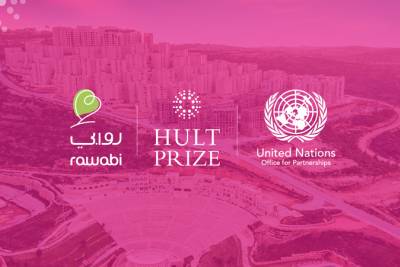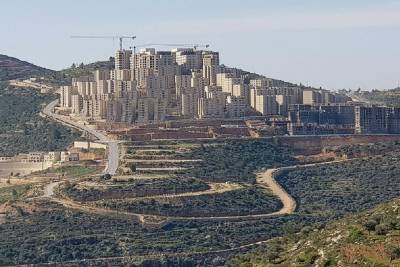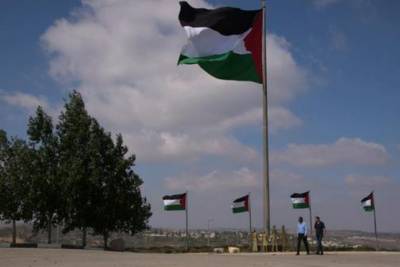Rawabi: A Planned Palestinian City for the West Bank
PBS News Hour - Is economic prosperity the future of peace between the Palestinians and Israel? A multimillionaire Palestinian‐American businessman thinks so and he’s putting his money to the test. He's raised $1 billion to build Rawabi, a brand‐new Palestinian city on the West Bank with the hope that it will create prosperity and that peace will follow
BASHAR MASRI: Palestinians tell me that the hair on their arm stands when they see the flag coming from the bottom and they see it on top of the hill.
MARTIN FLETCHER: You can hardly miss it – a thousand feet of Palestinian pride.
Among the dry West Bank hills about 20 miles from Jerusalem…
Bashar Masri is fed up waiting for the politicians to build a Palestinian state.
BASHAR MASRI: We are in a hurry. I am in a hurry.
MARTIN FLETCHER: So this 52‐year‐old Palestinian‐American businessman is building the first planned Palestinian city.
Securing an economic future for Palestinians Samir Hulileh, CEO of PADICO HOLDING talks with Martin Fletcher the private sector's role in rebuilding the Palestinian economy. “We are under occupation,” Hulileh said. “We cannot [become] prosperous under occupation. We cannot increase GDP by 30 or 40 percent. We cannot employ everybody. So everybody is trying his best…to create jobs and to create some hope for the generation to come.”
BASHAR MASRI: And I know most of my people are in a hurry. We would love to see a great nation for our kids and grandchildren, but we also want to see it for ourselves.
MARTIN FLETCHER: Masri has raised a billion dollars to fund the biggest private investment in Palestinian history.
That’s‐ that’s one big gamble for you.
BASHAR MASRI: It is a large gamble, definitely. However, if we the Palestinians don’t take risks then who are going to do that and our nation will never be built.
MARTIN FLETCHER: The message: get on with it.
Masri’s city is becoming a fact. Rawabi – it means “the hills” – some 40,000 Palestinians will live here.
Homes here cost between $60,000 and $180,000. You can even get a mortgage, once unheard of in these parts. The first two sections, some 650 apartments, are almost sold out.
BASHAR MASRI: There’s three movie theaters. Museum. A library. There’s a hotel. There’s a convention center.
This is Nablus gate. The one to the west is Jaffa gate. The one on the other side is Gaza gate. And the last is Jerusalem gate.
MARTIN FLETCHER: There’s no Tel Aviv gate?
BASHAR MASRI: No, Jaffa’s close enough. Okay?”
MARTIN FLETCHER: It’s all political symbolism. This is a Palestinian family, holding hands, united to protect the flag.
It symbolizes their future. And it’s everywhere – on trucks, cranes. Sending a message to the world….
And the Jewish settlement of Ateret, about a quarter mile across the valley, on land the Palestinians call their own. The settlers here have mixed feelings about their new neighbors.
AVIGAIL DAMRI: I hope they’ll have this good city and they’ll be‐ they’ll live happily, so maybe they won’t be so anti‐ and so angry. And maybe they’ll also live in peace with us. That’s what I hope for and I pray for. But I think that we also‐ also should like live here without any fear.
MARTIN FLETCHER: Rawabi sits in “areas a and b” of the West Bank – land fully or partially under Palestinian control. It is surrounded by “area c” – land fully controlled by Israel… where many of the resources come from, like water.
MARTIN FLETCHER: At the moment, you’re expecting people to move in maybe early next year. When they turn the tap on in their apartment will there be water?
BASHAR MASRI: We’re working hard to make sure they have water. If we do not, that will delay the project obviously.
MARTIN FLETCHER: So far, no permission from Israel to pipe in enough water. Another problem – roads.
This is the only access to Rawabi, a narrow two‐lane road suitable for a town of five thousand, not forty‐ thousand. So far, no permission from Israel to widen it more, or for more access roads.
In times of trouble, Israel could close it with a handful of soldiers. No road in, or out.
BASHAR MASRI: The road issue is a big problem.We have a number of outstanding issues.
MARTIN FLETCHER: The sales video makes Rawabi look fabulous but so far it’s just a shell. They need to attract industry, shopkeepers, build schools, create five thousand jobs. You’d think the PA, the Palestinian authority, which administers matters in the west bank, would back such an ambitious venture. But not exactly.
Masri carefully chooses his words.
BASHAR MASRI: They are supportive.
MARTIN FLETCHER: Are they supporting financially or morally or what?
BASHAR MASRI: Mostly, 99.9 percent morally. Hardly financially. So we’re building the public schools, we’re putting the wastewater treatment plant, the water reservoir, the access road to the city, which we did not anticipate on when we started the project.
MARTIN FLETCHER: You expected the Palestinian Authority to do it and to pay for it?
BASHAR MASRI: Absolutely. That is the right thing.”
MARTIN FLETCHER: Some Palestinians like parliament member Mustafa Barghouti think that telling Rawabi only as a success story obscures what he says is the larger Palestinian story of occupation and oppression.
MUSTAFA BARGHOUTI: My worry is that there is a certain trend in certain media – encouraged of course mainly by Israel or those who are connected to Israel – mainly to show things are fine, things are okay.
Palestinians are normalizing and accepting the system of occupation. And they even have a new city.
That’s not, that’s not true. This is not the real story.”
MARTIN FLETCHER: Unemployment in the Palestinian territories is more than 20%. Government salaries rarely paid on time, or in full. Yet in Ramallah – the Palestinian seat of power about six miles from the new planned city‐ there’s this mall for the Palestinian middle class. Kentucky Fried Chicken. A well‐stocked grocery store … and TV on a loop saying – buy in Rawabi, the city of the future.
MAHER ABU MADI: This is our first time in this…we bought it without even seeing it.
MARTIN FLETCHER: Maher and Abeer Abu Madi were introduced to us by Rawabi staff. They will live here with their seven children. Their 3000‐square foot apartment cost about $170,000 — expensive by local standards.
MAHER ABU MADI: This is all living room, four bedrooms, three showers, bathrooms.
MARTIN FLETCHER: He is a professor, she has a master’s degree and raises their children at home. For them, Rawabi is more than just a town.
ABEER ABU MADI: Maybe it’s my dream when I was a kid to – to live this life. So, I, uh, I did not manage to live this life. So I, I dream that my children will grow in this life.
MARTIN FLETCHER: And you’re giving them, you’re fulfilling that dream.
ABEER ABU MADI: I hope so.
MAHER ABU MADI: It’s also to show the world that Palestinians are not only about conflict with Israel.
It’s not about intifada and throwing stones and terrorism. It’s not like that. It’s also that we have our kids. We are educated. We have a future and we aim to have our independent state. 1301 our struggle existence in this land is through such projects.”
MARTIN FLETCHER: And that’s exactly what Masri thinks, too.
BASHAR MASRI: It’s a sample of the Palestinian state. And the Palestinian state is a big step towards peace.
To view original article, Click Here.



